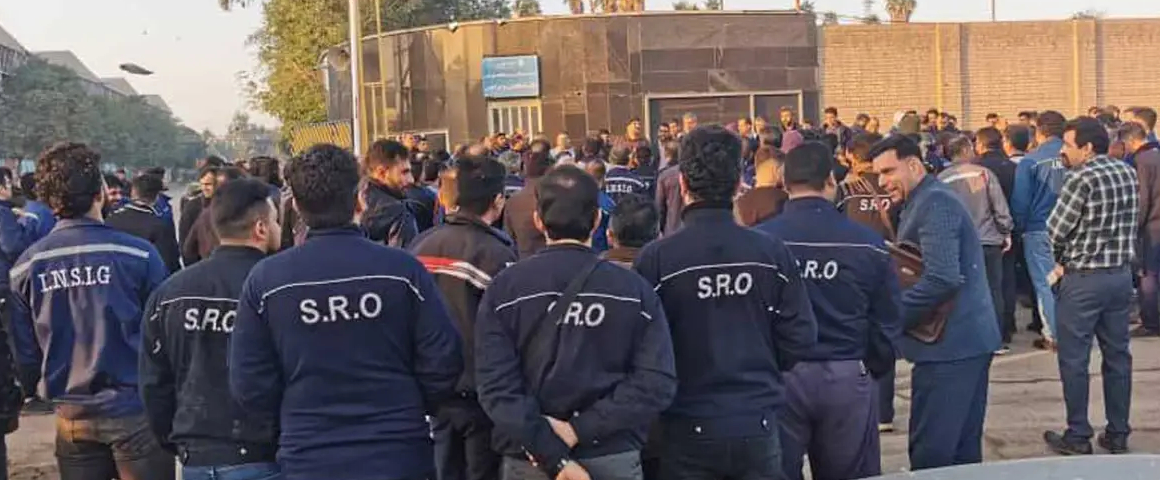The Committee for the Defence of the Iranian People’s Rights (CODIR) has issued an urgent call for the international labour movement to support Iranian workers in their struggles for improved recognition, pay and labour rights.
The strike wave and industrial action which has been a feature of life in Iran for the past two years continues to escalate into 2024. At the end of December, after 8 days of strike action, workers at the Iran National Steel Industrial Group (INSIG) in Ahvaz agreed to return to work after their employer promised to implement the Job Classification Act (JCA) at their workplace.
Without job classifications, workers can work full-time for years and be held in precarious temporary positions while being paid at varied rates, even while doing the same work. Workers at the INSIG work in an environment where the employer can arbitrarily deprive them of the right to make a living by simply disabling their entry cards. Workers live with the constant stress of becoming unemployed.
That the majority of wage earners in Iran are not covered by the JCA, and that their jobs remain unclassified, has become the status quo in Iran. In the past three decades, there have been thousands of spontaneous protests, strikes, sit-ins and work stoppages in many economic sectors – including education, healthcare, transportation, agriculture, automotive, energy and steel industries – aimed at forcing the government to meet its obligations under the JCA.
The recent strike at the INSIG-Ahvaz is the result of several years of struggle for which the workers have paid a heavy price, sustaining their fight in the face of intimidation and ongoing government propaganda. The right to demand job classification is the key to future struggles of Iranian workers. Knowing that without job classification their job security will continue to deteriorate, they continue to demand that they should be placed in their real job positions according to experience and qualification because they have invested time, effort and finance to acquire specialist skills.
CODIR General Secretary, Gawain Little, expressed outrage that workers in Iran are not even able to access these most basic rights.
“February this year will see the 50th anniversary of the passage of the JCA through the Iranian Parliament. Yet the Act has not yet been fully implemented in Iran as the regime sees maintaining economic uncertainty amongst the workforce as a higher priority than achieving fair pay and improved working conditions.”
The level of discontent in Iran can be measured in part by the wide range of strike action which is affecting all parts of the economy. Protests and strikes directed against the government by steelworkers, nurses and retirees are continuing across Iran, citing plunging living standards, government corruption and state oppression as the main areas of concern
In December, telecommunication retirees in 15 provinces protested outside the state-run Telecommunication Company’s offices. Other retirees, including former oil workers, teachers and other former public sector workers, also protested in many towns and cities. Goldsmiths in Tehran and Hamadan have been on strike to protest an increase in taxes, joining other goldsmiths across Iran.
In pledging the support of CODIR for the struggles of Iranian workers Gawain Little emphasized the scale of the present strike wave.
“Such open opposition to the regime in Iran, as expressed through the present strike movement, is unprecedented in the forty years of the Islamic Republic. Workers in the industrial, public and private sectors are combining to demand better terms and conditions but also express their dissatisfaction with the regime itself, adding a whole new dimension to the protests.”
The position of Iranian workers is further exacerbated by the state of the economy. According to the government-run news agency IRNA, inflation has risen to 250 percent in the past two years, massively impoverishing workers. Iran’s economic problems have been made worse by the ongoing sanctions imposed by the United States. In addition. Iran is increasingly in danger of being drawn into wider regional conflicts, not least the continuing Israeli genocide in Gaza.
CODIR has called for all forces supporting the struggle for trade unions, and human and democratic rights in Iran, to support the demands of Iranian workers through issuing statements of solidarity.
Support socialist media!
If you found this article useful, please consider donating to People’s Voice or purchasing a subscription so that you get every issue of Canada’s leading socialist publication delivered to your door or inbox!
For over 100 years, we have been 100% reader-supported, with no corporate or government funding.




